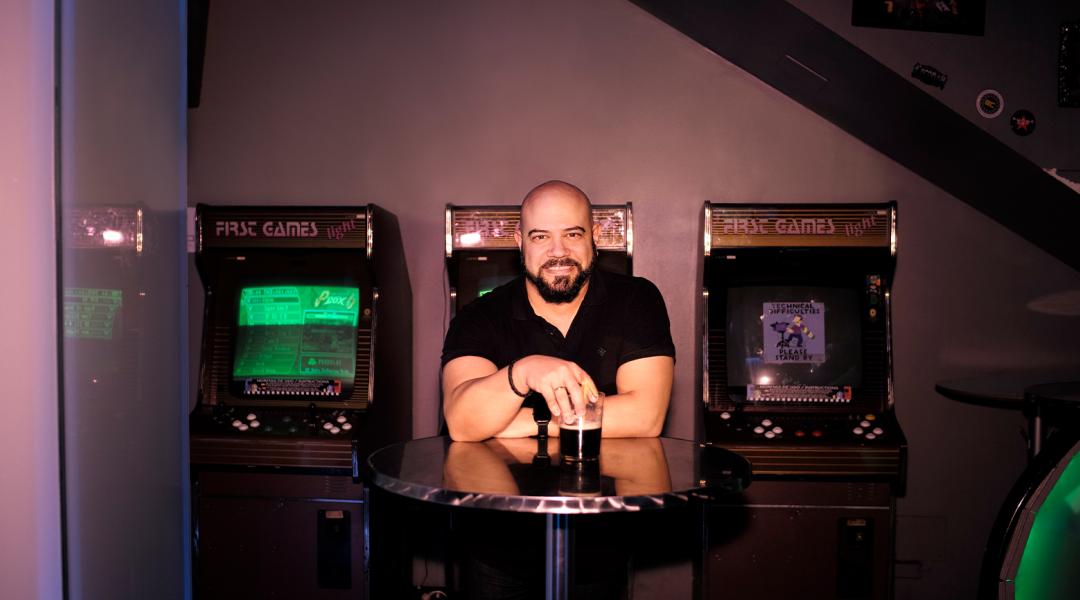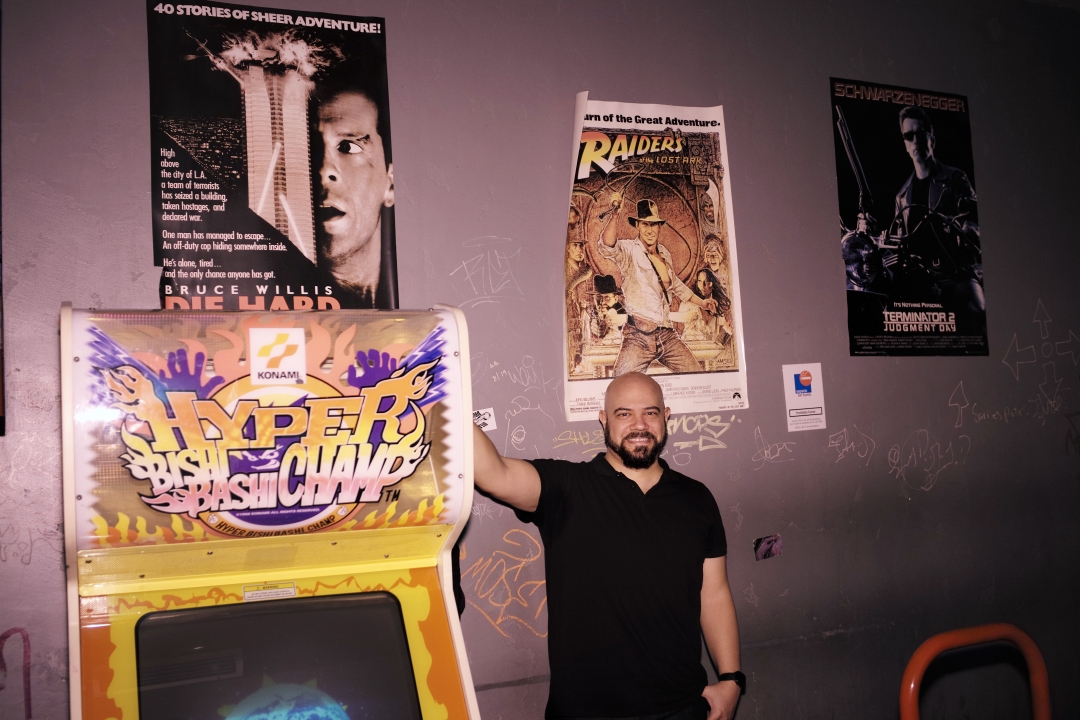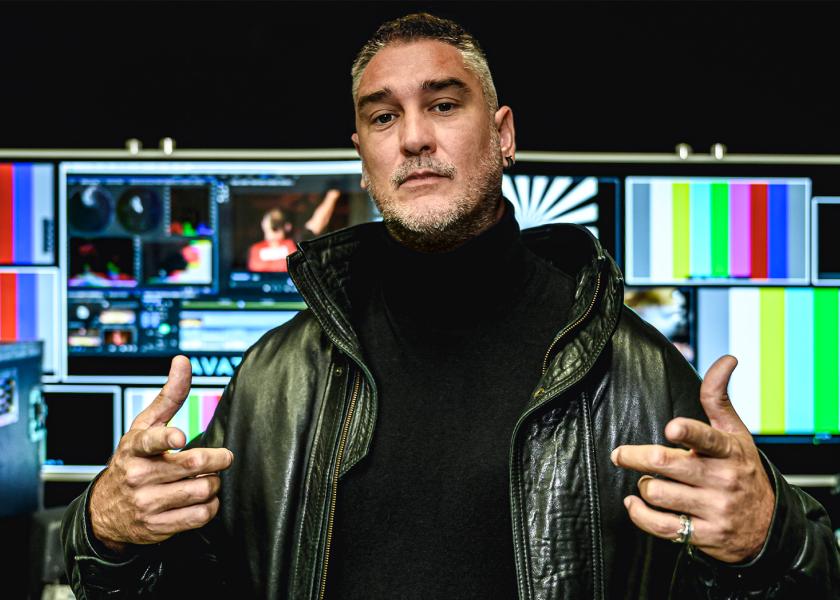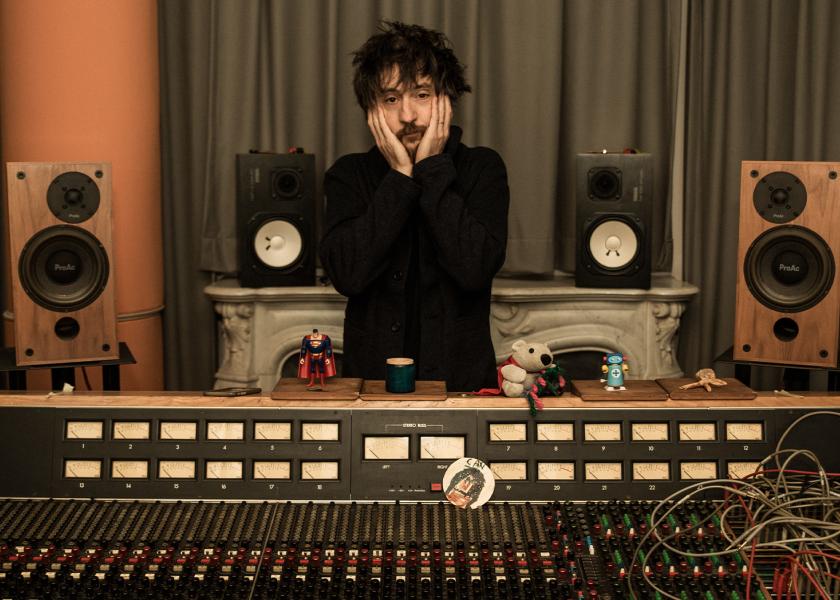Eduardo de la Iglesia
Soundtracks for Binary Realities

He’s as likely to make music for a fight between virtual warriors as a futurist adventure or a battle set during World War II. A forerunner on the other side of the pond, Eduardo de la Iglesia, from Madrid, talks to Talento a bordo about one of the most creative and unknown jobs of our time: making soundtracks for video games.
In an era where it feels like new professions emerge every day, the unusual job that Eduardo de la Iglesia (Madrid, 1977) has, which is already the biggest leisure industry in Spain, still stands out. Seasoned within the walls of the conservatory and as an orchestral musician (he studied the viola), as a child he spent more time in front of his sheet music stand than behind the ball, and today he is the leading video game musician worldwide. Only he can boast about composing the soundtracks of more than 55 games to date, among which are true classics of our time such as Red Matter, Gylt or Afterpulse. Work that has won him awards at the 16th Billboard Song Contest and USA Songwriting Competition, as well as a nomination for the Hollywood Music Awards. Next to nothing. Today, this composer splits his time between creating sound atmospheres through his position as Lead Sound Designer at Tequila Works and teaching Sound and Music for video games at university.
Your first jobs date back to 2001. When did you realise you wanted to work in this field?
I’ve loved music and video games since I was a child. My father was an amateur musician and I started playing guitar at a very young age. It’s funny, but as far back as I can remember, I knew I wanted to work creating music for video games. When I told my parents, they freaked out (laughs). They told me I could try as long as I always had a “serious” job, that’s why I also studied education to become a teacher.
How did you get into this world?
By chance, although I’ve always thought that one looks for chances. I’d started to play around with synthesisers and software at home, writing songs and imitating other artists. When I was 22, I met a guy at a party who told me that where he worked, Pyro Estudios —a video game developing company—, they needed a musician. I sent him some demos on a CD, and we met up. That’s where I learnt almost everything I know and where I started to approach other companies.
To date, you’ve made music for more than 55 games. Do you need to be a bit of a nerd to do this job or is being a good musician enough?
Yes, you need to be a nerd (laughs). Just because you know how to make music doesn’t mean you’re capable of writing for a video game. Not only do you have to know how to make music, you also have to learn how to handle digital sequences, MIDI notes, audio design... Before, it was common to believe that anyone who makes music knows how to create sound, but that’s not always the case.
Which is the hardest part of the process?
Sometimes we have very strict deadlines, we have to visit the offices to see how the game is coming along, learn new graphics engines... Sometimes I haven’t had a rest in weeks.
Which job are you the proudest of to date?
Probably the soundtrack I made for Red Matter, a virtual reality game. In fact, I’m going to release it soon on vinyl with a New York label.
In the last few years, gaming has entered our lives with a bang, both socially and in sport, film... What do you think is the reason for this?
The industry has grown enormously. Even Hollywood composers are writing music for video games! Before, you’d slot 25 cents into a machine and play for several minutes. Now, games can last 40 hours or more. We’re talking about games with high-quality graphics and an investment of around 200 million dollars, which is more than the budget Hollywood super-productions have. Today, the video gaming industry makes more money than film. They’re not just for kids anymore, and the big companies know it.
Do you think there’s more interest from the public?
Of course. Also, people my age still play today and are teaching their children because we’re a generation that started playing when we were kids. Before, video games were conceived as a pass-time to play with friends; today, they are educational, social, family-oriented, entertainment-based, etc. Some time ago, for example, I worked for The Journey of Elisa, a game that raises awareness and understanding about people with Asperger syndrome.

Eduardo de la Iglesia poses in front of one of the gamer temples in Madrid, Next Level Arcade Bar. © Silvia Varela
What software or machines do you use to make music?
I use Cubase and virtual libraries. Each time a new one comes out, I try it or buy it! It’s important to get sounds that perfectly emulate the instrument you want, especially for orchestral music composition.
What do you keep in mind when creating music for a particular game?
You base it on several things: the story, sketches of scenes and characters, the progression... In any case, the more information you have about the project, the better. It also depends on what the music is for; the music that accompanies a fight or an action scene won’t be the same as for a mystery scene. Despite this, it always has to fall within the same style. For example, when you listen to Mario Bros music, you know it’s from Mario Bros. It’s important that each project has its own musical identity.
In the last decade, many artists have emerged whose music features video game sounds. From Crystal Castles to Anamanaguchi, and Bondage Fairies or Meneo, who plays onstage with a Game Boy. What has changed?
Everything. 8 bits, pixel art and all these retro elements are in vogue. I always tell my students that in a game, music is music and sound is sound. Today, you can even go to the concert of a video game soundtrack or get the CD.
Since you wrote the music for the short Perrito Chino in 2012, featuring Rosario Pardo and Ana de Armas, you haven’t worked in film again. Is it a field that’s hard to get into?
It’s not for lack of trying! The problem is that if you don’t write music regularly for film, it’s hard for them to call you. Paradoxically, film and video games are still very separate worlds, and each has its own composers. It’s hard to break that barrier. Each producer and director already have a lead musician.
Is there a director you’d say yes to in a heartbeat?
Alejandro Amenábar.


